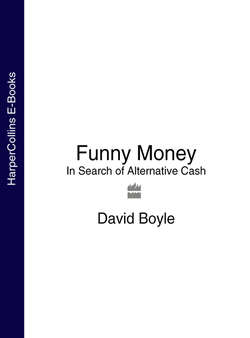Читать книгу Funny Money: In Search of Alternative Cash - David Boyle - Страница 9
IV
ОглавлениеSo I went there to find today’s new alchemists, to the land of the Treasury bill and Wall Street and the dustbowl and the Great Crash and Michael Milken, rumoured to be earning $1.5 million a day before his fall from grace. I went there because I wanted to write about the American attitude to money, because I thought it might be an antidote to our own rather puritanically English attitudes, and because there is another money revolution going on there. I wanted to find people who were looking for practical ways of producing the money we need ourselves, but I had another motive as well. I wanted to see someone I had known in London and who I missed when she had gone home to the USA to work for a big bank in Princeton.
You may think love is irrelevant to a discussion about money, but actually it goes to the heart of the debate. Money is supposed to be a measure of wealth – economists will tell you that is what it is. But actually if you look at the aspects of life that make you wealthy, they go way beyond money. Hot chocolate and relaxing over a video are wealth. Hot baths are wealth. Love and friendship and children are wealth: everybody apart from the most narrow-minded of economists knows that. Maybe you can’t measure such things in the nation’s accounts, but even so, I was wealthier for knowing my friend in Princeton and I wanted to know her some more.
I remembered as soon as I arrived how different American attitudes to money are. They have a self-confidence about it which we lack. They walk differently: if they need money they usually know they will be able to get a job and earn it. If they have a money-making idea, they tend to have supreme confidence that they will be able to make it work – should they want to. You don’t see those hunched, mournful types you run across every day on the London Underground, which is probably why there are now over 128 billionaires in the USA – 127 more than there were twenty years ago.
‘Our people spend their whole time being told they can’t do things, believing they can’t do things,’ said the British business guru Sir John Harvey-Jones – and he’s right. Money is more available to Americans, somehow. They don’t count it up and eke it out.
It is different there, and on one level we have always known it. For over a century, we have blamed American money culture for debasing our European standards, perverting our youth, causing crime, stultifying our men, luring away our women with expensive silk stockings. It’s not that there isn’t poverty in the USA – there is a terrible, powerless kind of poverty – but their attitude to the whole money business is different from ours. Americans don’t seem to have the same awe, respect or care about money, just as they don’t about land. They seem able to waste the former on glitz more than we can in Europe, just as they seem happy to waste the latter on mile upon mile of hideous ribbon development.
It is almost de rigueur for the British to be cynical about the USA, to deride its traditions and sneer at its judicial system, gun culture and bizarre romanticism, but I don’t share that sense of superiority. There is a welcoming generosity there, combined with energy and imagination, which I find inspiring. Americans also seem to touch the source of money more closely than we do, and amid their undoubted difficulties, it seems to give them a sense of liberation – however tough the business of earning money may be to them at the time.
So by visiting the sources of money in the USA, and tracking down the people who are reinventing those sources and bringing them closer to home, I wanted to write about that liberation – maybe get some of it to rub off on to my life too – and enter that peculiar alchemical world where money gets conjured apparently out of nothing.
Because for someone brought up with the picture of sober-suited City gents, serious bank managers and careful budgeting, the US money system is enjoyably non-rational. Vast sums slosh across their computer screens, yet the pockets of poverty are even denser than they are in London or Liverpool or Glasgow. This is, after all, both the richest and the most indebted nation on earth, where astrologers earn a great deal of money predicting financial patterns to Wall Street analysts, and where dogs get sent credit cards even without applying for them.
But then Zabau Shepard wasn’t able to actually use them: she found it hard to sign her name. It’s good to know there are some safeguards.
